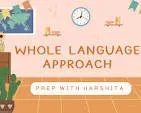Thank you for posting the definition of "whole language".
No, you don't know what you're talking about.
For a downloadable PDF, click here.

dyslexiaida.org
The most difficult problem for students with dyslexia is learning to read. Unfortunately, popularly employed reading approaches, such as Guided Reading or Balanced Literacy, are not effective for struggling readers.
These approaches are especially ineffective for students with dyslexia because they do not focus on the decoding skills these students need to succeed in reading.
Can individuals who have dyslexia learn to read? Yes. If children who have dyslexia receive effective phonological awareness and phonics training in Kindergarten and 1st grade, they will have significantly fewer problems in learning to read at grade level than do children who are not identified or helped until 3rd grade. 74% of the children who are poor readers in 3rd grade remain poor readers in the 9th grade, many because they do not receive appropriate Structured Literacy instruction with the needed intensity or duration. Often they can’t read well as adults either. It is never too late for individuals with dyslexia to learn to read, process, and express information more efficiently. Research shows that programs utilizing Structured Literacy instructional techniques can help children and adults learn to read.
Dyslexia is a learning disability that affects the way individuals process written language. Choosing the best educational strategies for dyslexia is crucial to support their learning needs. This blog post...

dyslexichelp.org
- Phonological Awareness Training: Dyslexic individuals often struggle with recognizing and manipulating sounds in words. Phonological awareness training helps develop these skills through activities like rhyming, segmenting words into syllables, and blending sounds. By focusing on phonics, phonemic awareness, and word decoding, this strategy strengthens the foundations of reading and spelling.


